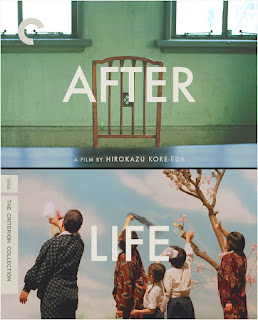My introduction to Kore-eda (following Japanese protocol of last name first) was a film named Still Walking from 2008. At this specific moment I can not recall if I rented it first then bought a copy, or if it looked interesting enough to just buy a copy. What I can tell you is that I thought it was a gorgeous film (and there should be a review of it somewhere on this blog). So since I really liked that film, I took a chance and bought After Life (Criterion Collection, spine 1089). This film from 1998 is his second non-documentary film (the first being Maborosi from 1995). The original Japanese title of After Life is Wonderful Life. My guess is that it was changed in English to not confuse it with It's a Wonderful Life. However After Life (the title) does give a good idea of where the film takes place.
The concept of the film is when you die you go to the after life - which is a bit of a way station in what looks like an old dormitory, or school building. While there you are asked to provide the one memory that you would like to hold on to for eternity. In this world, it seems like all the new arrivals show up on a Sunday and have till Wednesday to provide their memory to the staff at the way station. The staff then recreate that memory and film it using actors. On Saturday night all the short films are shown and when a person sees their film, they are transported from the movie theatre into the afterlife and the memory. I find that to be such an interesting take on death and the after life.
From what I have read, the process for this films creation started with Kore-eda interviewing hundreds of Japanese citizens and asking them questions about their favorite memory, or their most meaningful memory, etc. He then took this material and created this film. In some cases he even used the original interviewee to play themselves. Let me tell you know that they are not all old folk. The stories and memories that are shared are so specifically Japanese, and yet also universal. I found it to be a wonderfully beautiful film (with one scene that I felt went on too long).
The Criterion collection has a new digital restoration, new commentary (which personally I didn't get much out of, but it may be interesting to anyone who didn't grow up in Japan), deleted scenes, and interviews. Take a chance and give this a watch.

No comments:
Post a Comment